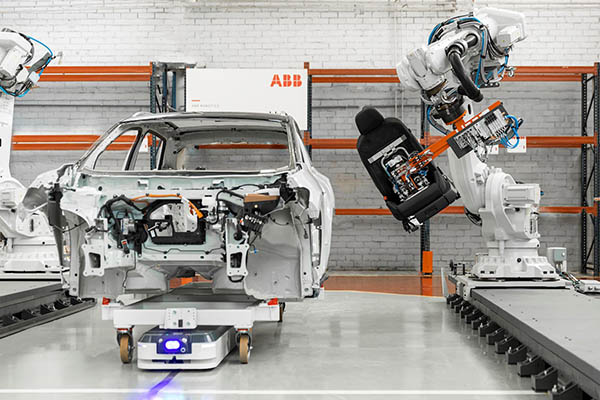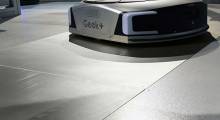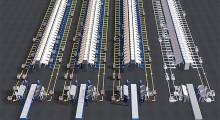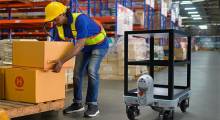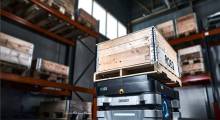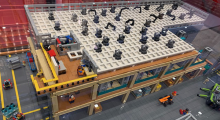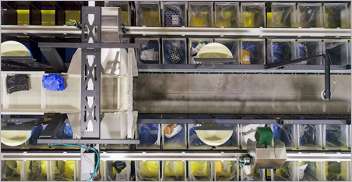ABB Group today announced that it will acquire ASTI Mobile Robotics Group, a provider of autonomous mobile robots and software. ABB said the acquisition is part of its external growth strategy and will make “it the only company to offer a complete portfolio for the next generation of flexible automation.” The transaction was signed yesterday and is expected to close in midsummer 2021. Both parties agreed not to disclose any details regarding the purchase price.
“With their industry-leading portfolio, comprehensive suite of software, and deep domain expertise across growth segments, ASTI is the perfect choice for us as we support our customers with the next generation of flexible automation,” stated Sami Atiya, president of ABB’s Robotics & Discrete Automation business. “With this acquisition, ABB will be the only company to offer a full automation portfolio of AMRs, robots, and machine automation solutions, from production to logistics to point of consumption.”
“This is a game-changer for our customers, as they adapt to the individualized consumer and seize opportunities presented by significant changes in consumer demand,” he added.
Founded in 1982, Burgos, Spain-based ASTI and employs over 300 people in Spain, France, and Germany. The company is majority-owned by Veronica Pascual Boé, who is also CEO. Other shareholders include European growth buyout investor Keensight Capital.
ASTI said it supports one of Europe’s largest installed fleets of autonomous mobile robots (AMRs) and has a broad customer base in automotive, logistics, food and beverage, and pharmaceuticals in 20 countries. Since 2015, the company has enjoyed close to 30% growth on an annual basis, and it is targeting approximately $50 million in revenue in 2021.
ABB, ASTI jointly offer flexibility with AMRs
AMRs support an unprecedented degree of flexibility, from production, logistics, intralogistics, and fulfillment through to retail and healthcare environments, said the companies. ABB and ASTI said their combination will enable customers to replace linear production lines with flexible networks, where intelligent AMRs autonomously navigate to bring materials, parts, and finished products between smart connected workstations in factories, logistics centers, laboratories, shops, or hospitals.
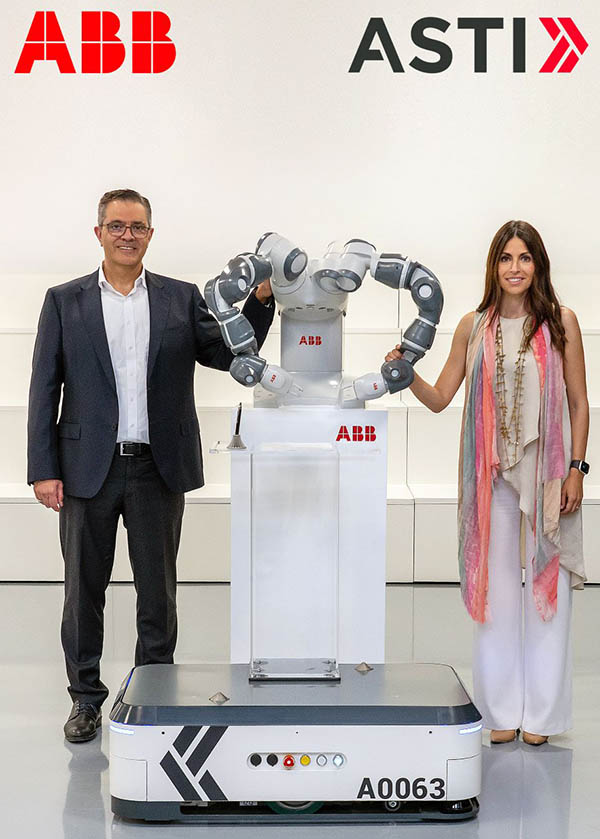
“ABB’s vision is a perfect match for us, as we both support our customers’ flexibility and competitiveness through accelerating automation in the workplace,” said Pascual Boé. “This is the next exciting stage of our journey, and together we will accelerate our innovation plans; expand our global customer service, partner network, production, and execution capacity; and leverage ABB’s market access globally and particularly in China.”
ASTI’s AMR portfolio includes autonomous towing vehicles, goods-to-person systems, unit carriers, and box movers, as well as software offerings, ranging from vehicle navigation and control, order and fleet management, and cloud-based traceability systems.
ABB said these technologies will be integrated with its own portfolio of robots, machine automation, modular systems, and software suite including the RobotStudio simulation and programming tool.
ASTI’s headquarters in Burgos, Spain, will become ABB’s AMR business headquarters, led by Pascual Boé, with core functions, including research and development, engineering, and product and project value chain, continuing at ASTI’s facilities. ABB plans to significantly expand production capacity at the AMR headquarters to support its planned sales expansion in Europe and the Americas.
ABB and ASTI said they offer deep domain expertise in manufacturing industries including automotive, food and beverage, and consumer packaged goods, as well as in new growth segments including logistics, e-commerce, retail, and healthcare.
ABB builds for global AMR growth
With global AMR sales expected to reach approximately $14 billion by 2025 with a compound annual growth rate (CAGR) of approximately 20%, ABB said it plans to expand AMR sales and service support globally to 53 countries.
To facilitate the growth potential for AMRs and Asia, ABB added that it will establish an Asia AMR hub including manufacturing at its new robotics factory, which will open in Shanghai in 2022. China, the world’s largest robotics market, is projected to account for $1.8 billion of AMR sales annually by 2025.
ABB Robotics’ acquisition comes shortly after the Zurich-based company announced an expansion in automation offerings for new sectors and first-time users. These included the launch of its GoFa and SWIFTI collaborative robot families and its plans to advance automation in the construction industry.
ABB, which has about 105,000 employees in more than 100 countries, said that by connecting software to its electrification, robotics and automation, and motion portfolio, it can drive performance to new levels. The company will focus on supporting flexibility, particularly the production of electric and autonomous vehicles, said Atiya.
Article topics
Email Sign Up

